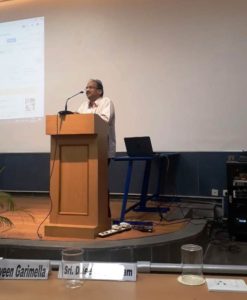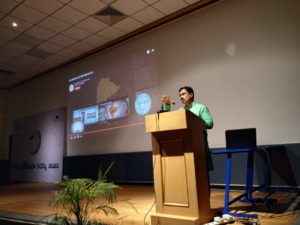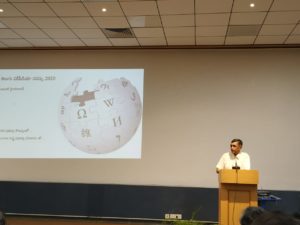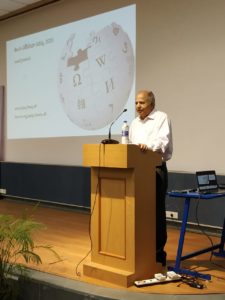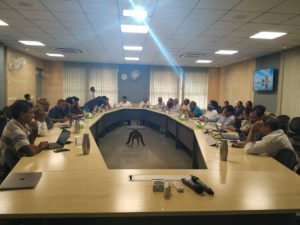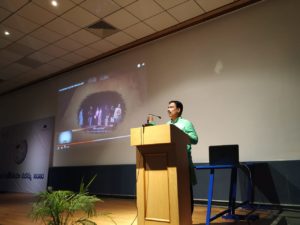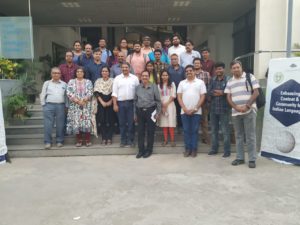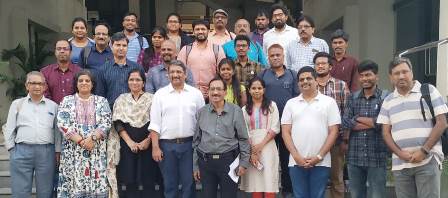The International Institute of Information Technology, Hyderabad (IIITH) conducted Telugu Wikipedia Symposium – 2020 at IIIT, Hyderabad campus on 8th February, 2020. Eminent computer scientist and Chairman IIIT-Hyderabad Prof. Raj Reddy, retired IAS & former legislator Jayaprakash Narayan, former MLC K. Nageshwar, Director, Dept. of Language & Culture Mamidi Harikrishna, Director IIIT Hyderabad Prof. PJ. Narayanan, Project Investigator, IndicWiki Prof. Vasudeva Varma, Asst. Director, ITE&C Dept., Sri Madhav Mudumbai, among others, graced the occasion.
Prof. PJ. Narayanan, Director IIIT, Hyderabad has welcomed the dignitaries and invitees assuring of all support to the Telugu Wiki Project. Prof. Narayanan thanked Ministry of Electronics and Information Technology, Govt. of India and ITE&C Dept., Govt. of Telangana for all the support. Prof. Vasudeva Varma has outlined the activities undertaken by Project Telugu Wiki team like forming four focus groups, organising Wiki workshops at IIIT, Hyderabad on Saturdays, setting up the stall at Hyderabad National Book Fair, among others. Around 800 enthusiasts enrolled to volunteer on Project Telugu Wiki, he stated. Project Telugu Wiki aims at creating 30 lakh Wiki articles in the coming years without compromising on the quality.
Prof. Raj Reddy, Turing Award winner, has shared his vision on the Project Telugu Wiki. He suggested that technology and machines can be leveraged to create vernacular content in bulk and the same can be curated later with human intervention. He further wished for a day where technology can translate the Wikipedia articles in one Indian language into another. Stating that the articles in English Wikipedia are not India-centric, he opined that the goal must be to create Indian language Wikipedia content from Indian perspective. Raj Reddy added that only 5-10% of the Indians are conversant with English and yet Indians constitute the second highest consumers of Wikipedia. So, the effort of creating more and more content in vernacular languages lies squarely on Indian Govts., technology companies, NGOs, language experts and volunteers.
The Indian language Wikipedias have to be populated with rich content and the same may be presented to the next generation learners. Institutional efforts towards Digital Literacy must be taken up for the people to use technology effectively. “Learn to learn and learn to think” is the guiding mantra!
Dr. Jayaprakash Narayan, retired IAS officer, opined that content-rich Wikipedias can be an antidote to several issues a diverse country like India faces today. Dr. JP Narayan stressed on the need to build a community of committed volunteers and subject experts. Wikipedians can bring to light hitherto unknown facts and highlights about a particular place, region or State and cited some examples to back this.
The Mamidi Harikrishna, Director, Dept. of Language & Culture, Govt. of Telangana, in his speech stated that Culture is the collective knowledge that humanity carries through generations and should be looked at in a broad sense. Telangana is home to diverse art forms and rich culture &heritage and it is essential for the Wikipedians to record this for posterity, he said. The Dept. of Language & Culture is extending all the possible cooperation and will continue to do so in future, Harikrishna assured.
Prof K. Nageshwar, former MLC, delved on the topic of challenges associated with content creation. He exhorted the Wikipedia enthusiasts to adopt newer technology platforms for content propagation. Wikipedia is the new-age technology platform to disseminate information, he opined. Explaining four dimensions of content – Creation, Curation, Updation and Consumption – Nageshwar asked the Wikipedians to do thorough research on the topic or base it from reliable sources. Nageswar underscored that content is supreme as all the technological platforms are already built and it is just about how we make good use of them. Language used in the Wikis shall be as close as possible to the language used by the common people, he advised.
The Madhav Mudumbai, Asst. Director, ITE&C Dept. stated that according to ICANN, next billion internet users would come from India and China and most of them prefer content in the vernacular language. Due to cheaper data rates and drop in the prices, smart phones have penetrated into rural and semi-urban areas. The Telangana Govt. had adopted the two-pronged strategy – Digital Literacy and digitising Telugu content. The ITE&C Dept. has taken up Localisation of Content as a priority item and Project Telugu Wiki is one of the programmes undertaken as part of it. Govt. produces huge quantities of content and the same can be leveraged for Wiki articles and vice versa. Wikipedia can also counter the fake news/ misinformation menace that is plaguing the country today, he concluded.
